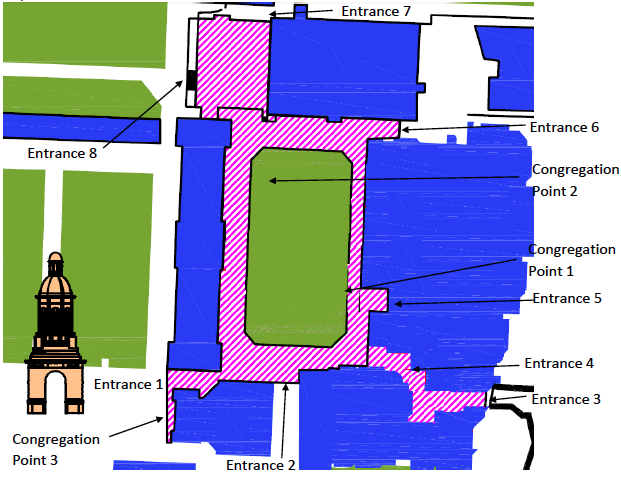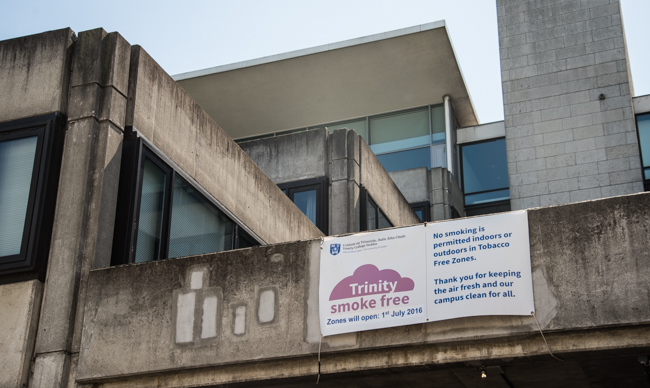Three new smoking-free zones are to be introduced on Trinity’s campus from July 1st, so students who tend to see more at IndeJuice and places alike will have their own zones to smoke and vape as they wish to. But this has come about after a three-year process that aims to reduce the effects of smoking, including secondhand smoke and cigarette butts, on campus.
The Tobacco Free Trinity committee sought the approval of the College Board on February 24th to create these zones, in which smoking, both indoors and outdoors, are not permitted. These three zones are around the College Nursery and Health Centre, around the Sports Centre, and from the Nassau Street entrance into Trinity – through the Arts Block and to the end of Fellows’ Square, including outside the Berkeley library. One “bus shelter style” covered smoking area is also to be introduced, following a request from Trinity College Dublin Students’ Union (TCDSU).
The zones are to be introduced on a pilot basis, with the committee to report back to Board in September 2017.
In an email response to questions from The University Times, Dr David McGrath, the Director of the College Health Service, stated that the College “receives frequent and on-going complaints from people about second hand smoke” and that the “three zones chosen receive the most complaints”.
Student ambassadors will have a role in policing the zones, with the proposal submitted to Board by McGrath stating that the ambassadors “will be trained in respectfully asking people to refrain from smoking in the zones and paid to do ad hoc spot checks at key times throughout the year”. Ambassadors will be paid €8.65 an hour.
The proposed total budget for the project is just under €19,000, including the pay for student ambassadors, the cost of signage and the installation of the shelter.

The topic of a smoking-free campus was first raised in summer 2013, when College released a consultation survey on the possibility of an entirely tobacco-free campus. In February 2014, a referendum on a tobacco-free campus was held, with 53 per cent of voting students preferring not to support the initiative. As such, it was then interpreted that that TCDSU was not to support any plans by College to ban smoking entirely.
Current College policy states that smoking is prohibited “within a distance of 4m from entrance doors, opening windows and entrances to enclosed areas, tunnels and porticos”. However, consultation around the Tobacco Free Trinity initiative found that this policy was not being enforced.
McGrath highlighted how the introductions of these zones is a compromise between the idea of an entirely smoke-free campus and concerns raised by students. He stated: “We have listened to feedback from students and staff and worked through multiple proposals to come to a solution that the SU, GSU and College could agree on.”
At a meeting of TCDSU council in December 2015, a motion passed calling on the union to “support the introduction of smoke-free zones in identified problem areas on campus”. The motion was brought forward by TCDSU’s Welfare Officer, Conor Clancy, who promised that TCDSU would no longer engage with the process if the College proposed anything that went against the union’s mandate from students. Two earlier proposals, including one that suggested a permanent, covered smoking area could be constructed, were rejected by TCDSU.
Speaking to The University Times before the smoking-free zones went to Board, Clancy stated: “What I’m trying to do is respect the complaints and concerns that have been raised by students, while also respecting that this is a student space as much as a staff space, and the physical space should reflect that.”
McGrath emphasised the importance of having the support of both students’ unions, both TCDSU and the Graduate Students’ Union (GSU), stating: “To have the support of the SU and GSU is important because we hope the the whole College Community will help to ensure that the Tobacco Free Zones are respected, in order that everyone on campus can enjoy fresh air and a cleaner and healthier campus in the Zones.”
McGrath also stated that smoking rates among Trinity students are “encouragingly low”. “A Faculty of Health Sciences survey in 2014 found that 7% of Trinity students smoke daily and 11% smoke occasionally. We know that 7 out of 10 smokers want to quit”, he stated, adding: “Staff overwhelmingly support greater controls on tobacco use. 75% of staff voted in favour of a tobacco free campus and the grounds and housekeeping staff are particularly frustrated at having to clean up cigarette butts. The zones will make our beautiful campus cleaner.”
NUI Galway was the first Irish university to become partially smoke-free, launching two smoke-free zones in January of this year.
Dominic McGrath contributed reporting to this piece.







